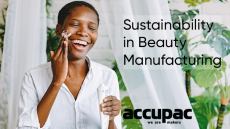Nano carrier molecules increase UV protection in sun care
could increase their effectiveness, whilst reducing the possibility
of undesired side effects, according to a recent study.
Research has been ongoing regarding the use of lipid carriers for sunscreen molecules, as it is thought they increase the product's effectiveness whilst decreasing potential absorption and therefore negative side effects.
However creating formulations with higher SPF values has proved difficult.
Recent work published in the International Journal of Cosmetic Science describes the use of solid lipid nanoparticles (SLN) and nanostructured lipid carriers (NLC) that can be loaded with significantly higher levels of sunscreens than previous attempts, leading to higher SPF factors.
According to researchers, a carnauba wax NLC proved to be the most efficient carrier, allowing for loading of up to 70 per cent, and therefore higher SPF factors.
Lipid carriers to reduce negative side effects Sunscreens contain either molecular sunscreens that provide protection by absorbing the UV rays or physical sunblock materials that scatter or reflect the UV light, or both.
However, fears surround the possible penetration of molecule sunscreens into the skin that could lead to side effects such as skin irritation, allergies and photo toxicity.
In addition, similar worries concern the absorption of the physical sun block molecules that would have undesired dermatological and functional effects.
Incorporating the molecules into SLNs and NLCs, instead of leaving them in an emulsion format, leads to reduced penetration and therefore reduced side effects, according to researchers.
Lipid carriers increase UV protection Moreover, the particles of the carriers themselves also block UV rays.
Therefore the incorporation of molecular sunscreens into such molecules leads to a two-fold protection against UV radiation.
"This means that the total content of molecular sunscreens in the formulation can be reduced while maintaining the protection level compared to emulsions with molecular sunscreens," wrote the authors.
In addition, the reduction in quantity of the molecular sunscreen used may further reduce the likelihood of undesired side effects.
Nanotechnology use is significant in sunscreens Nanotechnology and nanoparticles are increasingly used in sunscreens and sun care products.
Although many feel that the technology may lead to significant advances in the field, its use remains controversial.
Earlier this year Friends of the Earth called for a moratorium on the commercial release of all nanotechnological materials and products until various conditions are met, publishing a report containing a list of 'safe' nano free products.












